Radiology and Imaging Sciences Scholars (RaISS) Program
Radiology and Imaging Sciences Scholars (RaISS) Program

The Radiology and Imaging Sciences Scholars (RaISS) Program at the UC Davis Department of Radiology is designed to bring meaningful experiences to community college and early undergraduate students interested in possible careers in the medical field. The program offers exposure to clinical and research opportunities, along with essential support for skills development, mentorship, and community building. Through these experiences, students can explore pre-med and biomedical science opportunities which otherwise might be difficult to access or even unknown to them and their communities.
The program’s goals are not only to cultivate interest in radiology and imaging science and introduce students to UC Davis Radiology, but to help eliminate barriers that can keep many promising students from pursuing and participating in critical STEM fields. By offering these students an immersive hands-on experience, networking opportunities, research and academic resources, and the guidance needed to consider careers in health care and STEM, we can work towards improving health and healthcare systems that are truly inclusive and better for all. At UC Davis Radiology, we believe in RaISS, and we Believe in Better.
Mentors and Scholars
 |
Cyrus Bateni, M.D.As a college student, I had an opportunity to work with a primary care physician during a summer break. Prior to this, I was uncertain about what career I ultimately might choose, but this experience convinced me that health care was right for me. I, like you (probably) am originally from the Sacramento area, and attended UC Berkeley. Thereafter I have been in Philadelphia, Phoenix, Seattle, and back in Sacramento for portions of my medical training. I have been involved in almost all aspects of trainee education, including teaching radiology to medical students for more than 10 years. While I really do enjoy working, I also am very active, including regularly walking, biking, and lifting weights (among other things). I think that physical fitness and continuous learning are the keys to living a long and productive life, and thankfully also perfectly fit into my career as radiologist — hopefully you teach me something new each day as well. |
 |
John M. Boone, Ph.D.John Boone is a medical physicist with technical expertise in breast imaging, computed tomography, and radiation dose issues in diagnostic radiology. Boone is a researcher in diagnostic imaging, and has focused on issues in radiation dosimetry, breast imaging, and computed tomography. He has led an effort at UC Davis for 20 years on the development of Breast CT, and this technology is now at the threshold of clinical translation. He has also worked with collaborators to develop new x-ray tube technology which may revolutionize breast tomosynthesis imaging, and other areas in diagnostic imaging. |
 |
Abhijit J. Chaudhari, Ph.D.Director, UC Davis Center for Molecular and Genomic Imaging Research/Academic Interests: |
 |
Michael Germuska, Ph.D.Michael Germuska's research focuses on the development and application of novel MRI techniques for mapping and quantification of cerebral physiology. He is interested in the physiological and metabolic underpinnings of healthy brain development/function and diseases of the central nervous system. |
 |
Felipe Godinez, Ph.D.While in high school I became really intrigued with physics, biology, and mathematics. I started to think of my career and became conflicted between engineering and medicine and found middle ground in biomedical engineering. I earned a Mechanical Engineering degree from UC Riverside, which opened the door to many graduate career paths. I decided to enter the Ph.D. program at UC Davis in Biomedical Engineering. I learned about medical imaging sciences and engineering. Afterwords I trained in London U.K. at King’s College London where I specialized in MRI hardware research. Throughout my training experience I have enjoyed participation in education and mentorship programs. I have mentored students from high school to undergraduates, and graduate students and I have really learned so much in the process. I have seen how hard work, dedication, and open-minded thinking has transformed so many of my friends and colleagues, who have successfully reached their goals. |
 |
Andrew Hernandez, Ph.D.Clinical Interests: Research/Academic Interests: |
 |
Michael Craig (Mike) Larson, M.D., Ph.D.Clinical Interests: Research/Academic Interests: |
 |
Sarah Eva McKenney, Ph.D., D.A.B.R.Clinical Interests: Research/Academic Interests: |
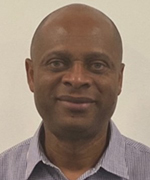 |
Chima Okam, N.P.My name is Chima Okam. I moved from Southern California to Sacramento about three and a half years ago. I joined UC Davis around the same time. I am a nurse practitioner in the radiology department. I received my nurse practitioner evaluation from Duke University. I have been a nurse practitioner for 10 years. Prior to that I was a nurse for seven years. I have worked as a nurse practitioner in various specialties, including cardiology, neurosurgery, and currently in radiology. I enjoy working at UC Davis, especially in the radiology department. I learn every day from my colleagues and patients. I was excited when I heard about the RalSS Mentorship program and wanted to participate in any meaningful way to help our underrepresented populations in exploring careers as radiologists. I am looking forward to this opportunity. I am married with four children (two boys and two girls), two in college and two in high school. I enjoy all things sports. I am excited about the upcoming Summer Olympics. I also enjoy traveling, hiking, running, and biking. |
 |
Tracy Yarbrough, M.D., Ph.D., M.A.Ed.Philosophy of Care: Clinical Interests: Research/Academic Interests: |
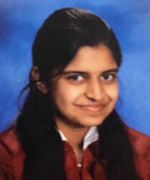 |
Maham AzizAmerican River College (Los Rios) In the next 10 years, I hope to become a doctor, especially a radiologist. I always love science and technology, and I want to use them to help people. I think being a radiologist is special because I can use machines to look inside the body and help doctors find out what is wrong with the patient. I believe that with this job, I can make a real difference in people’s lives, and that is why I want to do it. I am working hard to get into medical school, and I hope to attend UC Davis School of Medicine. I want to learn everything I can to become the best doctor I can be. After medical school, I will work hard to be a radiologist. I also want to do research in radiology to help make new discoveries that will make things better for patients. Growing up, my life was not easy. I am the first person in my family to graduate from high school, and the first one to go to college. This was a big deal for me and my family because we did not have a lot of resources or knowledge about how to succeed in school. I always tried my best, but it was hard. English is not my first language, so learning to speak, read, and write in English was a big challenge for me. There were times when I felt like I would not be able to keep up with other students. In high school, I struggled a lot with English. Sometimes I felt like I didn’t belong in class because I could not understand everything that was said. I spent extra time after school and on weekends studying English. I would ask teachers for help, and I would practice speaking with my friends. Slowly, I began to feel more comfortable. I learned that it is okay to ask for help and that nothing worth having comes easily. I worked hard every day, and I was proud to graduate in the top 10 percent of my class. Even after high school, there were times when I wanted to give up. College was different and harder, and I sometimes felt like I wasn’t smart enough. But I didn’t give up. I kept working and believing in myself, and little by little, I started to understand more. It was not easy, but it was worth it. Every time I struggled, I reminded myself of how far I’ve come. Being the first one in my family to do all this was hard, but it also made me stronger. I have learned so much from all the challenges I faced. I learned that no matter where you come from or what challenges you face, you can achieve great things if you don’t give up. I learned that I am capable of more than I ever thought. I want to help others and be an example that no matter how difficult things get, with hard work and dedication, everything is possible. I am excited about the future. I know it will not be easy, but I am ready. I want to become a radiologist and make my family proud. I know that the hard work and struggles will lead to something great, and I can’t wait to continue my journey. Every challenge I faced made me more determined, and I am confident that with perseverance, I will achieve my dreams. I will continue to work hard, knowing that I am on the right path. This is the beginning, and I am excited to see where my journey takes me. |
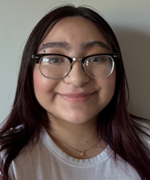 |
Veronica BeltranCosumnes River College I aspire to become a medical researcher, being part of the advancement of healthcare by working behind the scenes to study disease, improve treatments, and promote equity in medicine. I have always envisioned myself making a difference in the medical field, not necessarily through direct patient care, but supporting through innovations and discoveries done by research. What draws me to research is the power to create long term impact. A single discovery can improve outcomes for many people. This potential for lasting change is what inspires me the most. More specifically, I also want to focus on research that addresses health disparities in underrepresented communities. These populations often experience higher rates of chronic illness, reduce access to care, and systemic neglect within the healthcare system. I believe that science and research can play a central role in addressing these inequities. By contributing to studies that explore the social determinants of health, I hope to help close those gaps and ensure that advancements in medicine are inclusive and accessible to all. My educational goals are closely aligned with this vision. In the coming years, I hope to transfer from community college to a UC, where I can continue to build my foundation in healthcare as well as gain valuable experience with research and lab activities. The path to this goal has not always been easy. As a low-income, first-generation college student. I have often had to navigate the academic world without much guidance or support. Many of my peers had access to guidance and resources that I initially lacked, which made finding opportunities more difficult. At times, this made me feel like I was constantly trying to catch up. But rather than allow these challenges to hold me back, I use them as motivation to take initiative and create my own path. I actively sought out programs, volunteering opportunities, and mentorship, often without anyone to guide me. I made it a mission to take up every opportunity that aligned with my goals, no matter how small it seemed. Along the way, I discovered that persistence, curiosity, and resourcefulness can open many doors for me to explore. I also made sure to build a support system that reflected my values and aspirations. One of the most impactful steps I took was joining the Pre-Health club on my campus, where I eventually became an officer. Serving in this leadership role helped me connect with like-minded peers and create a sense of community among students with shared goals. Organizing events, bringing in guest speakers, providing resources, and mentoring others who face similar challenges gave me a platform to support others while continuing to grow myself. Looking ahead, I want to delve deeper into medical research and expand my involvement in studies that aim to improve healthcare outcomes and promote health equity. |
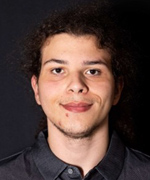 |
Aundre CanfieldSierra College My career goal right now is to go to medical school and become a medical doctor, though I am not sure at the moment what field I want to go into. I want to be a doctor because I find the medical field interesting, and I think that I would be able to commit time and effort into learning about the medical field and go through the processes of getting into medical school. I want to work in a field that uses knowledge and learning to improve people’s health and be part of a team that can use problem solving skills to help people through chronic issues or prevent issues from becoming life-threatening or debilitating. Part of my long-term goal involves looking at different fields and trying to get as much experience as I can so that I can explore my options and try to choose a field where I would be the most effective. Right now I am 1 year away from finishing up my classes required for transfer at Sierra college, and I am planning on transferring to a 4-year university, either UC Davis or CSU Sacramento, to complete my prerequisites for medical school. While in medical school, I plan on exploring my options for potential fields that I think I can do well in and be an efficient and productive practitioner. I am in the UC Davis Avenue M program and am currently in the mentoring program with a professional in the field of dermatology. Additionally, I think that radiology might be something I am interested in. I plan on participating in programs like this to gain clinical or research experience so I can better identify my strengths and skill set. I hope to use these experiences to choose a career path that I can be a helpful, knowledgeable, and productive member of, so that I can better help patients and my future team. I understand that on this journey, there will be challenges and setbacks. During my second year at Sierra College, one academic challenge I faced was burnout and life issues impacting my academic ability. I noticed that I was struggling to keep up with the new material and deal with things happening at home at the same time. Around the time the issues at home were resolved, I ended up failing a class that I needed for transfer. This led to a serious blow to my confidence in my academic ability and my plans for medical school. Over the semester break, I took a critical look at what went wrong that semester and thought about how I could have handled balancing school and home life better and worked to bring these changes into my next semester. In the next semester, I ended up taking a lower course load and worked to focus on maintaining a good pace and studying more effectively so I could keep up with classes and handle anything else that could come up at home. |
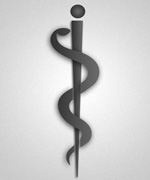 |
Sara DelgadoSacramento State Growing up I have always wanted to become a medical doctor, that does not mean I have not looked at other careers outside the field of medicine, but to this day I can’t see myself doing anything else. Along with personal experiences it has shaped me into creating a purpose in life which is to do something for others. I am currently a biological science major which I currently don’t regret choosing as I enjoy it very much. Which has led me to want to someday do both research and treat patients. As I have learned, research is very valuable as you can one day possibly help humanity through discovery. Some academic challenges I have faced so far was adjusting to community college after high school, and for a moment at the beginning of my first year in college I almost lost my goal of becoming a physician due to having no guidance I thought my dream was over as my goal seemed impossible till I got into the AvenueM program which reignited my passion. Hearing from multiple physicians about how they got to where they were, I learned there is no one perfect route to get to where you want to be as long as you don’t give up, you will one day get there. |
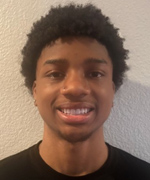 |
Chigozie OkamFolsom Lake College In five years, I aspire to be a computer scientist, specifically working in cybersecurity. I want to be someone who helps design and create systems, all while defending them as well from potential threats. I would also like to incorporate my skills into healthcare, introducing new innovations and breakthroughs such as AI in the clinical setting. My interest in healthcare stems from healthcare professionals and my idolization of those who work in that field. I am intrigued by the idea of combing computer science with medicine to create innovation that will support patient care. I've always viewed hospitals and the people who are in these fields as heroes of our world, giving it their all day in and day out to improve and save the lives of others, which is nothing short of heroic. At the same time, I sparked an interest in computer science, which stems from my interest in problem-solving and being analytical. I’ve always been drawn to the “why” behind how things work. These are questions I found myself asking quite often throughout my life. I've always wanted a better understanding of not only computers but human behavior and medical understanding beyond the surface level. I wanted to understand why. This activated a sense of fascination and intrigue within me that I wanted to figure out as I got older. Which was my primary reason for picking a science study. I want to learn and understand more of the science behind not only computer software but also radiology. The idea of using imaging as a way to diagnose, treat conditions, and monitor excites me. This field will help me blend my computer science skills in the healthcare field, which is something I couldn’t ask for more. It will help me build important qualities such as precision and analytical skills, all while connecting with others and building relationships as well, which are all high qualities I strive to achieve one day. The importance and responsibility of a radiologist is a quality I admire the most, and it is a trait I’m fully motivated to adopt. I am very open to gaining knowledge from medical professionals, including research and clinical experiences. One of the most significant academic challenges I have faced has been collaborative work. I have had problems adapting to my environment and what it means to work as a group throughout my life in education. But that’s a main incentive for me to apply myself and be in situations where I need to understand how to work collaboratively, which is why I would like to be a part of this team. I want to grow and learn more while sharpening my knowledge and building better collaborative skills. I'm eager to gain hands-on experience and expand my understanding of not only what it means to study radiology but also healthcare as a whole. It’s an opportunity to learn, contribute, and bring a new perspective for myself to see where I would also want to direct my future. |
 |
Mika RudyAmerican River College My long-term goal is to get a degree in radiology and become a radiology technician. I have wanted to work in the medical field for as long as I can remember but it took me a while to figure out which role would best suit me. I ultimately decided on radiology because it gives me the opportunity to work directly with patients and offers a wide range of modalities. When I first began my journey in furthering my education it was a great obstacle for me. At the time my mother had just passed, and I was not in the correct phase of my life to focus on my studies. Since I have been back to school, I have maintained a B average in all the classes and have expanded my knowledge in the field of science. I am making it a priority to participate in as many opportunities to expand my knowledge as much as possible. I'm hoping to be accepted into this summer program to gain some insight on the world of radiology before applying for my program in the spring. |
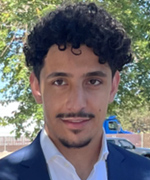 |
Abdullah AltahanAmerican River College (Los Rios) In the future, I see myself as a clinical researcher. I aspire to work on the clinical trials of currently incurable viruses like HSV and HIV. My particular interest with these viruses roots from a personal experience in elementary school, where I experienced a fever followed by a cold sore. There was a sudden wave of embarrassment and anxiety, but with time and conversation with my primary care doctor, I came to understand the vast prevalence of this virus and the unreasonable stigmatization. As I grew up and learned more about this virus, and the dire need for a new form of treatment or a cure for the millions who carry it. In college, I joined in on a research opportunity led by my chemistry professor. As weeks went on, I became more drawn into the field of research. I learned to operate different instruments and analytical machines, and expanded my knowledge in the field of chemistry. |
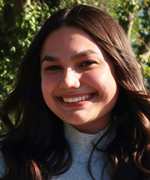 |
Alexa BoltonSolano Community College In 10 years, after successfully transferring to UC Davis and then medical school after that, I aspire to be a practicing medical doctor. This has been my goal and dream since I was a little girl as I have always wanted to help people and also make them happy. As I have been working with programs like AvenueM, where I meet and network with physicians and current medical students, and volunteering in the hospital, where I help nurses and patients with anything they need, I have become aware of the lack of access to healthcare in so many communities close to me and realized I want to help make a difference. Along with becoming a doctor, something else I hope to accomplish in 10 years is opening up my own free clinic. I want it to be a place where I can help the people in communities who have no access to free healthcare or healthcare they cannot afford. Having the clinic run by students who are aspiring doctors like me and can have the chance to become aware of the disparities in healthcare like I have is also a goal of mine. In the future, I am also excited to become a mentor to pre-med students who start out in community-college, like other doctors have been for me these past few years. Seeing what they have accomplished has given me hope in times where I became burnt out, that it is possible with hard work and time to reach any goal. I want to be able to provide that kind of hope for someone else one day. |
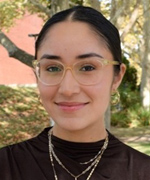 |
Paola Gonzalez HernandezAmerican River College (Los Rios) Since high school I was always fond of understanding the fascinating systems within animals and humans. Taking a beginner anatomy and physiology course my senior year of high school really helped solidify my decision to further my education in this field. The only thing left to decide was what career I could pursue that would give me a sense of purpose and allow me to continue studying biology to a greater extent. Joining the Pre-Health Club at my community college exposed me to various types of fields within healthcare and ultimately helped me decide I wanted to become a physician. It was not only this exposure to the field of healthcare that introduced me to medicine, but my upbringing did as well. After immigrating to the United States with my mother, my family faced a number of struggles. One of them being having access to quality and culturally competent healthcare. My mother who was diagnosed with myasthenia gravis not too long after we moved to the States seemed anxious every time we went to one of her doctor appointments. She was afraid she would not be understood or undermined for her status in the country. Not only was she afraid of this treatment, but the stress of having to pay for every appointment was overwhelming for our entire family. There was only so much I could do as a 12-year-old girl, but being present at her appointment and confirming that the interpreter said what the doctor would say, gave her a sense of ease. I would attempt to interpret for her when an interpreter wasn’t available, and she would always tell me I could be a great doctor one day if I wanted to. Ultimately, seeing my mom’s struggles for feeling heard and culturally understood inspired me to become a physician that could provide culturally competent care to people going through already stressful times in their lives. To begin this journey, I enrolled at community college straight after high school and have plans to transfer to a four-year university this upcoming fall to complete my undergrad majoring in biology and minoring in Public Health. My dream is to join a rural-physician pipeline program where I can be placed in areas where culturally competent care is needed most. |
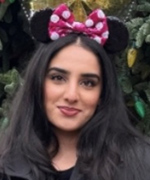 |
Kiran KhatkarYuba College My sophomore year of high school, I remember going into the ER because my grandpa had pneumonia. My family and I believed that would be the very last moment we saw him. Despite not knowing precisely what caused his illness, his physician gave us a sense of security and comfort. In similarity, my goal is to become a physician specializing in orthopedics, who can offer consolation to patients and show confidence in my knowledge during every moment of time. Whether I am faced with my biggest challenge or smallest, I aspire to be a provider who provides patients with equality and respect. Physicians provide a sense of comfort to patients and their families through their depth of knowledge and expertise that they obtain through years of dedication. Patients feel comfortable knowing that physicians are always committed to providing the best treatment possible. What drives me to seek a career in medicine is the unique position and privilege that allows me to fulfill all these roles, including improving one's quality of life. I aspire to be at a level to provide a treatment approach that reflects a patient's entire narrative. As I practice medicine, I hope to redirect the focus from potential concerns to the positive outcomes that will be achieved through the unique capabilities that medicine has to offer. I want to become an M.D. because it is a profession that will allow me to make a difference in people's lives by providing care, support, and treatment to those in need. As someone passionate about science, healthcare, and helping others, becoming an M.D. offers a fulfilling career where I can continuously learn and grow while positively impacting individuals and communities. |
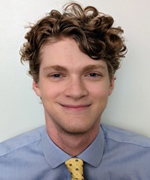 |
Aiden KutneyAmerican River College (Los Rios) Hello! To give some pertinent background, right out of high school I became an E.M.T. and have been working as one since. At first, the plan was to become a firefighter paramedic and then nursing. As I was going back to school for nursing prerequisites, specifically while taking human anatomy and physiology, I found the content I was learning fascinating, so much so that I switched my career trajectory to medical school. Every week I’d learn a new physiological feature or piece of anatomy that connected the dots from the education received throughout E.M.T. training. Radiology is a specialty that has gained my interest as it implements a deep and wide-ranging understanding of anatomy, physiology, and pathophysiology. Also, the science implemented in the field of radiology is fascinating (MRI, CT, fluoroscopy, PET). Currently, I am transferring this fall to UC Davis to major in biotechnology with an option in bioinformatics. I plan to continue my educational journey and learn information related to biotechnology, but more so the computer science associated with bioinformatics to then implement related technology into medicine. Overall, I have the dream to make it through medical school, residency and practice a specialty that I have interest in, radiology being one of them. |
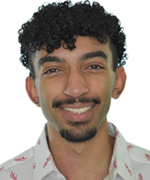 |
Malik MartinMy goal is to become a medical doctor specializing in orthopedic surgery. I have always had an obsession with the art and science of medicine. After interviewing doctors from numerous specialties and hearing about the best and worst parts of their jobs, I became most excited about surgery, specifically orthopedic surgery. I love the combination of artistry and scientific complexity of surgical procedures, whether performing a shoulder replacement and using hammers to put the prosthetic into place, or a CMC arthroplasty maximizing skill and dexterity to create a new joint in such a tight space. The basis for all orthopedic procedures is the diagnostic imaging results used to create a complete picture of the problem, relating objective and subjective symptoms with structural damage or abnormalities. This clinical challenge and the ability to improve someone's quality of life with surgery has me mesmerized. My mom is a very creative person who takes joy in handcrafting detailed cards as a hobby. However, after dealing with hand pain for years, it reached an all-time high in the spring of 2022, leading her to take time off from work as a COVID-19 vaccine clinic coordinator and occupational health nurse because she could not even pinch a patient’s arm to administer a vaccine. Hand pain had incapacitated my mom, preventing her from performing her job and enjoying her hobbies. Her overall quality of life had plummeted, and she was forced to have surgery. The hand surgeon performed a CMC arthroplasty on her hand and within a matter of six months, she went from being in constant pain to creating handmade thank you cards for the surgeon who helped improve her quality of life. I used to drive my mom to all her appointments after surgery, so I got to know the surgeon well. When he invited me to shadow him in the OR, I jumped at the chance. I shadowed the surgeon in the clinic and stood next to him during numerous surgeries. I loved every second of it. My experiences with the orthopedic surgeon and seeing the significant improvement in my own mom's health and quality of life truly solidified my commitment to be a physician and this is the only thing I can see myself doing as a career. |
Our Program
Mentorship: Each scholar will be paired with at least one UC Davis Radiology Department member for career mentorship.
STEM-Engagement: Scholars will be coached on and engage in a six-month long imaging science project (time commitment each week to be worked out between scholar and mentor/advisor), which may be focused in one of the following areas:
- Information Technology/Computer Science
- Environmental Sciences
- Physics/Physical Sciences
- Biological Science/Chemistry
- Patient Safety, Engagement and Quality Improvement
Networking: Throughout the course of the program, scholars will be provided opportunities to network with mentoring faculty and with other scholars.
Program Start Date: June 2, 2025
Program End Date: November 22, 2025
Length of Program (in Weeks): 24
- Participate in clinical and/or research for six months.
- Participant time commitment based on discussion with mentors — expect at least six hours per week (i.e. one half to one workday per week) on average.
- Weekly live cohort discussion/lunch-and-learn with Q-and-A with one of the mentors.
- Each participant picks one other (secondary) experience/exposure that they want to visit during the six months.
- Each participant picks a project (research project or clinical application/exploration) to complete in the six months, based on one of the five areas of focus; may pair up on a project if desired.
- Attendance in seminars and noon lectures.
- Be currently enrolled at a partner California community college or up to a Sophomore-credit equivalent in an undergraduate program
- Minimum GPA of 2.5/4.0
- Completed the following coursework in college studies (unofficial transcripts will be submitted with your application):
- At least one course in Human Anatomy, Biology, or Physiology, with lab component
- At least one course in Chemistry, with lab
- At least one course in Mathematics (College Algebra or higher)
- At least on course in Written Communication/Writing
- Clearance as per Radiology observership guidelines
Felipe Godinez at fgodinez@health.ucdavis.edu or Kayla Wilkerson at kswilkerson@health.ucdavis.edu
